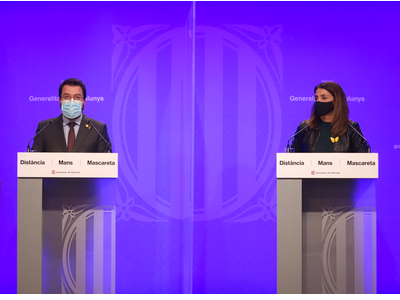- The Vice-President of the Catalan Government and the Minister of the Presidency have explained that the first measure to be taken, within the framework of the Procicat, will be to limit night mobility
- The decision was taken yesterday by an Extraordinary Executive Council
- Vice-President Pere Aragonès emphasized that the aim is to "have all the tools and guarantees in order to take the necessary measures" to "save lives"

The Catalan Government Agrees to Request the State of Alarm in Catalonia in order to Assume Full Command of the Situation
In an extraordinary meeting of the Executive Council on Friday afternoon, the Catalan Government agreed to formally request the declaration of the state of alarm to the Spanish Government. A state of alarm "decentralised, with full command of the Catalan Government" to confront the second wave of the pandemic. She also announced that a night curfew throughout Catalonia will be decreed once the state of alarm comes into force. The Vice-President of the Government and Minister of Economy and Finance, Pere Aragonès, and the Minister of the Presidency and spokesperson for the Catalan Government, Meritxell Budó, announced these intentions in a joint appearance before the media.According to the Vice-President, the aim of this initiative is “to have all the tools and guarantees to be able to take measures such as limit mobility, allocate resources, protect citizens' health and respond to the needs of the crisis. In short, to save lives”. He requested the citizen's responsibility to stay at home, limit social life to essential social interactions and reduce mobility. “This is the best way to protect ourselves, and to protect the people we love and the most vulnerable. We must strengthen our social responsibility and our civic attitude", he stressed.
“The evolution is very worrying; either we multiply the efforts or Covid-19 multiplies” because “No one is invulnerable to Covid-19. We cannot relax for a moment, we cannot drop our guards, we need to protect ourselves, take care of ourselves, and reinforce the civic and social commitment that helped us so much last spring” warned Aragonès. He explained that the evolution of epidemiological data in recent days has led the Government to take this decision and assess the application of more restrictive and exceptional mobility measures than those adopted so far. “For this reason, we need a decentralised state of alarm and the Catalan Government needs to be the only competent authority in Catalonia in relation to the measures of the state of alarm, maintaining all the competences and capacity of management. Taking every decision, assuming all the responsibilities” he remarked.
The Vice President also stated that the Government is committed to strengthen transparency and permanent communication with all the political groups in Catalonia. In this sense, he stated that "our will is to appear periodically before the Catalan Chamber to explain the measures taken by the Government under the declaration of the state of alarm".
Vice-President Pere Aragonès and Minister of the Presidency Meritxell Budó appeared before the media after the Extraordinary Executive Council and the meeting held electronically with the spokespersons of the parliamentary groups, together with the Minister of Home Affairs, Miquel Sàmper, and the Minister of Health, Alba Vergés.
During the appearance, the Minister of the Presidency announced that the Government has already communicated this agreement to Spain so they "authorise this tool as soon as possible and urgently". Contrary to March's state of alarm, this state of alarm is not to be declared "unilaterally, recentralising powers and borrowing those of the Catalan Government", she explained. She added that "this tool must enable us to keep all the competences and take the measures the Catalan Government determines in the framework of Procicat".
In this sense, she pointed out that once the state authorizes the state of alarm in Catalonia, "we will immediately convene an urgent Procicat, probably tomorrow, to take immediate measures, such as restricting night mobility", as well as “other kinds of decisions without waiting for any judicial authorization, because we will have the necessary legal coverage to be able to apply them”. Some measures, she said, "should also enable us to preserve economic activity and not need to be more restrictive for the economy and trade".
Regarding the reasons that have led the Executive Council to take this decision, Minister Budó stressed that "health data shows we must act urgently". She recalled that there are currently 1,698 people hospitalized for Covid-19, 296 of whom are in the ICU; that there have been more than 5,000 new positive cases only in the recent weeks, and that Rt is on the verge of 1.5.
To confront this situation, Meritxell Budó also called for "citizen's co-responsibility during the weekend" and urged "to avoid unnecessary travel and stay at home at night, although the reduction of night mobility is still not in force”.